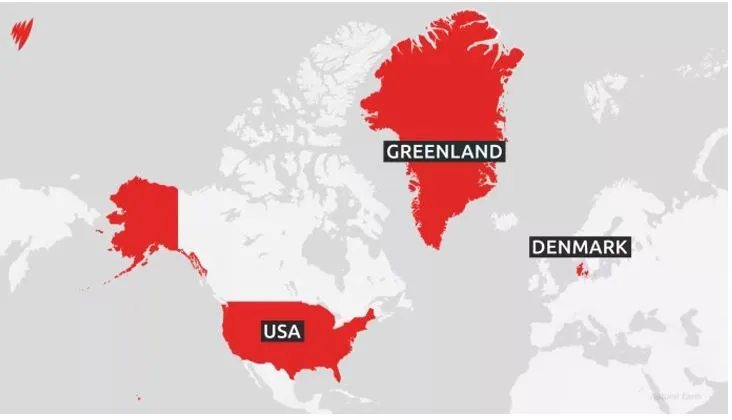

10th May 2025 (13 Topics)
Context
A report in the Wall Street Journal (WSJ) revealed that U.S. intelligence officials had been gathering intelligence on Greenland — particularly:
- Greenland’s independence movement
- Public opinion on U.S. mineral extraction projects
The Backdrop (Trump’s 2019 “Buy Greenland” Proposal)
- In 2019, then-President Donald Trump publicly floated the idea of buying Greenland from Denmark.
- Denmark and Greenland outright rejected the idea.
- Trump then cancelled a state visit to Denmark, calling the PM’s reaction “nasty” — which strained diplomatic relations.
- Trump later said he was serious about the idea due to Greenland's strategic value.
US’s interests in Greenland
Greenland, a semi-autonomous part of Denmark, became strategically important for the U.S. during World War II when the U.S. established its military base, which remains today as Pituffik Space Base. Greenland is increasingly seen as strategically critical due to three major factors:
- Arctic Military Importance: The Arctic is melting rapidly due to climate change, opening new shipping lanes and access to natural resources.
- The U.S. operates the Thule Air Base in northern Greenland — a key radar and missile warning site.
- Greenland sits between North America and Europe, making it important for ballistic missile tracking and early warning systems.
- Mineral & Resource Richness: Greenland is believed to hold vast deposits of rare earth minerals, oil, natural gas, and uranium- resources critical to modern electronics and defense industries. As countries decarbonize, competition over such critical minerals is intensifying, especially between the S. and China.
- China’s Arctic Ambitions: China is investing in infrastructure and mining in Greenland and calls itself a “near-Arctic state”. The U.S. sees this as part of China’s polar strategy to gain a foothold in the Arctic.
Hence, the U.S. sees Greenland as strategically vital to national security, economic interests, and great power rivalry in the Arctic.
Implications for India
- Arctic geopolitics now involves strategic minerals, shipping routes, and climate science — all important for India’s energy security and foreign policy.
- India is an observer in the Arctic Council and has released its Arctic Policy (2022). Events like this shape the rules-based order India wants to see in the region.
- Also raises questions for India’s own intelligence diplomacy — how to balance cooperation with key allies while avoiding similar controversies.
About Greenland
 |
More Articles

